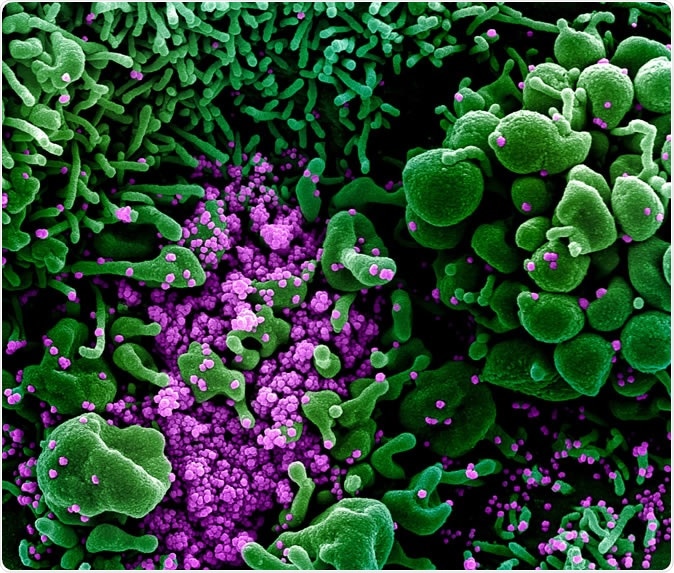The coronavirus disease (COVID-19) has rippled across the globe, spanning 155 countries with infections. The virus has touched all continents, except Antarctica, making it a global pandemic. The novel coronavirus has now infected more than 196,000 worldwide, while more than 7,800 have succumbed to the viral infection.
One of the most concerning issues since the emergence of the COVID-19, which is caused by the severe acute respiratory syndrome coronavirus 2 (SARS-CoV-2), has been whether those who have recovered from it can contract it again for the second time. Will those who have recovered have the immunity against the deadly virus?

Novel Coronavirus SARS-CoV-2 Colorized scanning electron micrograph of an apoptotic cell (green) heavily infected with SARS-COV-2 virus particles (purple), isolated from a patient sample. Image captured and color-enhanced at the NIAID Integrated Research Facility (IRF) in Fort Detrick, Maryland. Credit: NIAID
There are reports of patients testing positive for the coronavirus for a second time around in South Korea, China, and Japan. These countries were the first to experience the wrath of the novel coronavirus.
China was the epicenter of the outbreak since January since it is where the virus originated. It virus was first reported in Wuhan City, Hubei Province, when several patients manifested pneumonia-like illnesses. Most of the cases were linked to a seafood market in the city, where wild animal trade was common.
Reinfection reports
China, Japan, and South Korea have reported patients who tested positive twice with the coronavirus, sparking concern of its potential spread even if people have already recovered.
In China, the origin of the virus, there had been more than 100 cases of patients who were discharged and recovered, but then tested positive again for the second time. In one case, a man in China had died due to COVID-19 after he was discharged from the hospital. Particularly in Guangdong province, health authorities reported 14 percent of people who recovered in the area had reinfection.
Japan also reported reinfection in a patient who has recovered from the novel coronavirus disease. Japanese health officials said a woman who was declared virus-free had tested positive again. Now, scientists are left baffled about these cases.
Professor Mark Harris, a virology expert at Leeds University, said that reinfection is unlikely, but there is some evidence from previous studies for persistent infections of animal coronaviruses.
Sir Patrick Wallace, the UK government’s chief scientific adviser, and Professor Chris Whitty, the chief medical adviser, reassured the public that those who had the infection would develop some immunity, and it is a rare occurrence that a person can contract the infection again.
Health experts believe positive retests are more likely to be errors in testing, rather than reinfection. Further, some experts agree that reinfection is an unlikely explanation for patients who gets a positive result a second time. They note that testing error could be the culprit, or doctors have released the patients too early, making them positive during a retest.
Shed high levels of coronavirus
People who are infected and harbor the virus shed high levels of the pathogen, but most are likely not infectious once recovery begins.
A new study in Germany cites that early on in the infection of patients, they emit high levels of the coronavirus, which helps explain its rapid and efficient way of spread across the globe. Many countries experience the vast spread of the virus, where most are through local transmission. Each day, thousands of new cases are being reported in Europe, the new epicenter of the COVID-19 outbreak.
The study, published on a preprint server, which is not yet peer-reviewed by health experts, sheds light on how virulent the virus is, infection thousands of people. So far, the virus has infected 196,640 people and killed 7,894 patients.
The study found that people with mild infections can still get positive results by throat swabs for days and even weeks after their illness. Those who are only mildly sick are likely not infectious by approximately ten days after the onset of symptoms.
“This is a very important contribution to understanding both the natural history of Covid-19 clinical disease as well as the public health implications of viral shedding,” Michael Osterholm, director of the University of Minnesota’s Center for Infectious Diseases Research and Policy, said.
Sources:
- https://www.theguardian.com/world/2020/mar/16/the-big-question-over-coronavirus-can-a-person-get-it-twice
- World Health Organization (WHO). (2020). https://www.who.int/health-topics/coronavirus
- Osaka Prefectural Government. (2020). http://www.pref.osaka.lg.jp.e.agb.hp.transer.com/hodo/index.php?site=fumin&pageId=37523
- https://www.forbes.com/sites/brucelee/2020/03/15/can-you-get-infected-by-coronavirus-twice-how-does-covid-19-immunity-work/#2074c60b5c0f
- U.S. Centers for Disease Control and Prevention (CDC). (2020). Interim Infection Prevention and Control Recommendations for Patients with Suspected or Confirmed Coronavirus Disease 2019 (COVID-19) in Healthcare Settings. https://www.cdc.gov/
- https://www.caixinglobal.com/2020-03-06/covid-19-patient-dies-days-after-being-declared-recovered-101524580.html
- https://www.caixinglobal.com/2020-02-26/14-of-recovered-covid-19-patients-in-guangdong-tested-positive-again-101520415.html
- Woelfel, R., Corman, M., Guggemos, W., Seilmaier, M., Zange, S., Mueller, M., Niemeyer, D., Vollmar, P., Rothe, C., Hoelscher, M., Bleicker, T., Bruenink, S., Schneider, J., Ehmann, R., Zwirgmaier, K., Drosten, C., Wendtner, C. (2020). Clinical presentation and virological assessment of hospitalized cases of coronavirus disease 2019 in a travel-associated transmission cluster. Medrxiv. https://www.medrxiv.org/content/10.1101/2020.03.05.20030502v1